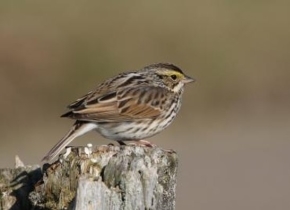

Researchers taught two dozen wild sparrows new songs, by playing them the recordings of sparrows that live thousands of miles away. Jason G. Goldman reports.
研究人员播放数千英里以外的麻雀录音,教会了二十几只野麻雀的新歌。Jason G. Goldman报道。
杰森 G. 戈德曼(Jason G. Goldman)
翻译:张朵儿
审校:张清越
Only a few kinds of animals are known to learn their vocalizations from listening to others. Us, of course. Elephants. Bats. Cetaceans—whales and dolphins. Pinnipeds—walruses, seals and sea lions. And parrots, hummingbirds and songbirds. That's it.
据现在的了解,只有少数动物是通过倾听他人来学习发声的。人类显然是其一,还有大象、蝙蝠、部分鲸类,如鲸鱼和海豚,和鳍足类动物如海象、海豹和海狮。鹦鹉,蜂鸟和鸣禽(songbird)也可以。就只有这些。
"When your cat meows or your dog barks, it does that because it has genetically inherited that sound. But birds are like us, young animals have to hear adults in order to develop normal sounds."
“猫叫、狗吠都是遗传自基因里的声音。但是鸟类和人类一样,幼年时必须听到成年个体的声音才能学会发声。”
University of Windsor biologist Daniel Mennill.
温莎大学生物学家丹尼尔·门尼尔(Daniel Mennill)说。
There have been hundreds of conventional experiments done in laboratories with captive birds that support the idea that young birds learn to sing by listening to older birds. These studies also taught us that birds, like humans, have what's called a "sensitive period" early in life, a time when they are most disposed to learn how to vocalize from their elders.
在实验室里,早已进行过了数百次传统实验。通过关在笼子里的鸟类试验证明,幼鸟要通过听成年鸟的声音来学习唱歌。这些研究还表示,鸟类和人类一样,在幼年期会有一个所谓的“敏感时期”。这个时期,它们最容易向长辈学习如何发声。
But nobody ever did one of those experiments with wild birds. Observational studies, yes. But no true experiments. Until now, thanks to some wild savanna sparrows.
但是还没有人在野生鸟类上做过类似的实验,有过观察性研究,但没有过真正的实验。非常感谢野生稀树草原麻雀(savanna sparrow)给了我们一个在野外进行真正实验的机会。
"So this population of savanna sparrows lives on an island in the Bay of Fundy in eastern North America, and it's been studied since the 1960s, so we know a lot about this population. It means we know every kind of sound that has ever been uttered by a savanna sparrow in this population over the course of many decades."
“这群稀树草原麻雀生活在北美东部芬迪湾附近的一个岛上。自20世纪60年代开始就有团队对它们展开研究,所以我们对这群麻雀比较了解。这意味着,我们知道近几十年来这群麻雀在不同时期的叫声。”
Mennill and his team installed a series of loudspeakers on the island, and they played new tunes that the sparrows would never have heard otherwise.
门尼尔和他的团队在岛上安装了一系列扬声器。他们播放一些麻雀们从来没听到过的调子。
"The kinds of sounds that we broadcast to the animals were based on savanna sparrows, the same species, but recordings collected on the western coast of North America, many thousands of miles away from our study population."
“我们播放的声音也来自稀树草原麻雀——是同一物种,但是来自数千英里外的北美西海岸的鸟群。”
For six years, the researchers broadcast these novel songs to five cohorts of sparrows.
研究人员持续六年将这些新颖的“歌曲”播放给了五组麻雀听。
"Lo and behold, this bird that arrived to breed in the spring of 2014 opened his beak and sang a song that was a perfect match with one of our stimuli."
“瞧,这只在2014年春天出生的鸟张嘴唱了一首与我们播放的音乐完美搭配的歌。”
In all, 26 birds learned their songs from loudspeakers rather than from other birds. And they had the same survival and reproductive success as all the other birds. All but one successfully mated and defended their territories. And four additional birds learned songs from birds that had originally learned from the loudspeakers.
总共有26只鸟学习了扬声器里的歌曲,而不是同类的叫声。它们与同类具有相同的生存和繁殖能力。除了一只之外,所有人都成功完成了交配并保卫了自己的领土。还有另外四只鸟又从最初通过扬声器学叫声的鸟类身上学习了发声。
"What we have now is a very unique, maybe a globally unique population of animals, where some of the animals sing population typical songs, that sound like other animals in their breeding population. But our experimental subjects who are living there now, are singing songs that are slightly different."
“我们现在有一个非常独特的,也许是全球独一无二的动物群体。其中一部分唱的是本土的曲调,而另一部分,我们的实验对象却唱得略有不同。“
By returning to the island year after year, Mennill can study not only vocal learning, but the transmission of culture from one generation to the next. There’s a lot going on in those bird brains.
通过每年不断的回访,门尼尔不仅可以观察麻雀声音上的学习情况,还能看到一代代更迭后的变化。麻雀的脑中变化复杂着呢。
 京公网安备11010502039775号
京公网安备11010502039775号